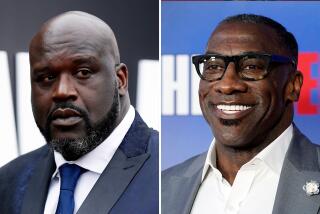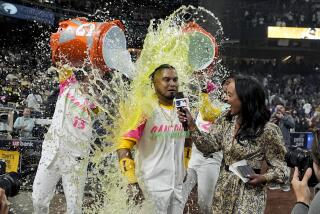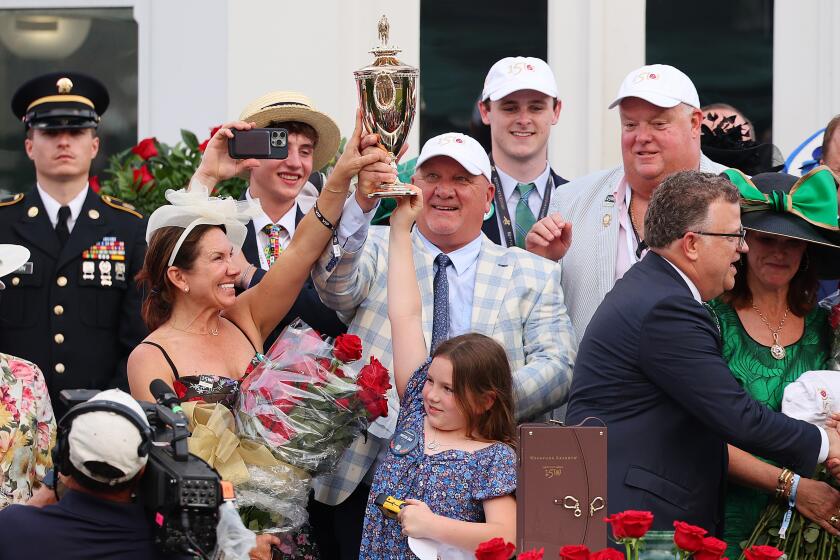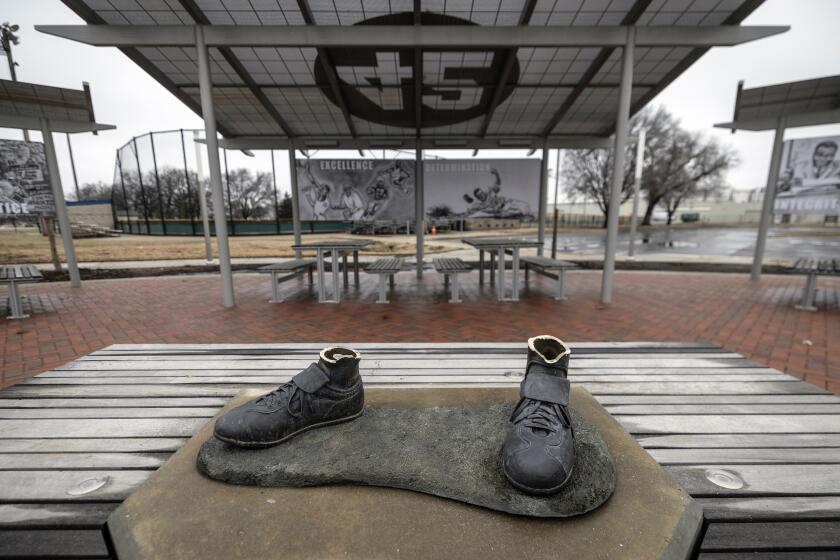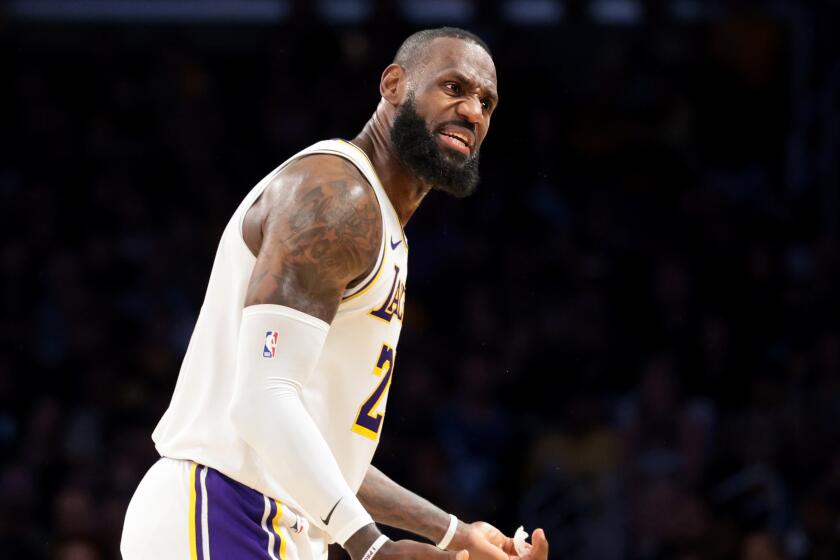Becker, the Reigning King, Is Magic Word for Wimbledon Fans
They camp overnight outside the gates, sleeping on the lawns and sidewalks, waiting to fork over four pounds--about six bucks--for standing-room-only tickets that go on sale the next day. “Queueing,” they call it here, as in something a billiards player might do. Waiting in line, is what it means. Or, for those from New York, waiting on line.
It amazes players such as the Aussie Pat Cash, who says: “The English fans are so much more dedicated towards tennis than (people from) any other country. There’s no way anybody in Australia would do this. They might sit outside for a rock concert once a year, maybe, but not every day, not for tickets to a tennis tournament. That’s just unbelievable to me. Sometimes I feel like if I’ve got a spare pass, I just want to go out and give it to somebody.”
They wait because they love tennis here; always have. Yet, the lines really do resemble a rock concert’s, like the ones that dotted downtown London last week for George Michael and Wham. The mobs waiting in the queues outside the tennis stadium seem to be getting younger by the hour, partly because of the glamorous young faces they come to see like Cash and Argentina’s Gabriela Sabatini, but very much because of the reigning king of swing, the teen idol from West Germany, Boris Becker, who is threatening to win Wimbledon once again.
In the year since a 17-year-old came, saw and conquered the stuffy All England Club--the first unseeded player ever to become champion here--Becker has been a blessing to his sport in terms of general public interest, particularly at a time when Bjorn Borg is a 30-year-old retiree, John McEnroe is taking a sabbatical at 27, Jimmy Connors is approaching his 34th birthday, and Ivan Lendl by himself has all the box-office appeal of Pia Zadora playing Lady Macbeth.
Boris is boffo. He is a big, boyish strawberry blond who, if “The Boris Becker Story” ever needs filming, will certainly be played by Anthony Michael Hall of Brat Pack and “Saturday Night Live” fame. He is affable and makes goofy, friendly gestures to both opponent and crowd. He is hot stuff. The biggest bank in Germany, Deutsche Bank, hired him as a good-will ambassador for a million marks a year, or roughly $380,000. Coca-Cola signed him up last week. Boris Becker appears to be the real thing.
But is he? Some people need convincing. Not that the 1985 Wimbledon was a fluke--he deserved what he got--but it did not escape everyone’s attention that, through various turns of fortune, Becker won the tournament without having to play McEnroe, Lendl, Connors or Mats Wilander. In his first grass-court match after Wimbledon, Becker was beaten by a Dutchman, Michiel Schapers, in Australia. He failed to make the quarterfinals at the U.S. Open. His biggest victory besides Wimbledon was Cincinnati.
Becker’s raw ability is not in question. There is that serve that earned him the handle “Boom Boom” Becker, the one that thundered for 21 aces in the Wimbledon title match with Kevin Curren. It is a serve “as good as any I’ve ever seen,” Joakim Nystrom of Sweden said. And those acrobatic, headfirst lunges of Becker’s for points have become his most dangerous weapon and his trademark.
The kid can play, no doubt about it. Lendl’s first loss of 1986 came in March at Chicago, at Becker’s hand. And Boom Boom looks good so far at this Wimbledon, although he slipped during the third set of Saturday’s 6-4, 6-4, 4-6, 6-4 victory over Australia’s Paul McNamee, was bothered by a sore Achilles’ tendon for a while and dropped a set for the first time all week.
Is Becker vulnerable? He has made the round of 16 but has tough Mike Pernfors of Sweden ahead of him next. Becker got a break in his half of the draw Saturday when fifth-seeded Stefan Edberg was upset by Miloslav Mecir of Czechoslovakia, 6-4, 6-4, 6-4, but he still does not have it easy--and McNamee, his latest victim, seems doubtful of his ability to repeat.
“He’s certainly good enough to win Wimbledon, but he’s also his own worst enemy, putting so much pressure on himself, and he can’t win it in that frame of mind,” McNamee says. “As soon as the match got close, he started freaking out. As soon as the sets got close, he was a totally different player. I really think someone else is going to exploit that.
“Obviously the pressure of defending is affecting him, as you would expect. It’s nothing to be ashamed of, but he’s going to have to deal with it more effectively if he wants to win the tournament. If Cash plays him, it’ll be different. I still think Pat can win it. Boris has to deal with the pressure, but he’s not dealing with it as well as he did a year ago. He’s a hell of a nice kid, and good luck to him, but it’s going to be tough.”
Of course, that’s what they said last year. Even after losing to Becker in five sets, Nystrom was skeptical, especially because twice in their match, Nystrom had served for the match. “He won’t win Wimbledon, not this year,” Nystrom insisted after that match, but he was wrong, even though Becker also had to go five electrifying sets to hold off Tim Mayotte. It was not as clear cut a Wimbledon victory as some people choose to remember.
“Last year I came in as a nobody, and nobody was expecting anything,” Becker says. “This year I’m defending champion, and a lot of people expect me to make it to the finals, or even to win it.”
Yes, they do. And possibly he will. Pernfors, playing on grass for the first time in his life, is doing just fine but is poor-mouthing his own chances against Becker. “I just hope I don’t get blown off the court,” Pernfors says. “This is his surface.”
Becker laughs and counters: “He says it’s his first time on grass. Well, it looks different to me, but when he says that, you have to believe him.”
Today is Wimbledon’s day off, and Becker will spend it watching West Germany play Argentina in the World Cup soccer final. It is his passion, a game he once played himself. West Germany will win, Becker says, enjoying himself immensely.
“Why? Because I am German, because I was born in Germany, because I live in Germany, and because I think the Germans are better. We don’t have Maradona, but we have at least 10 other players. Argentina has only one. He’d have no chance against me.”
The Wimbledon crowds watch Becker and respond to him, cheer for him, wait all night just for a chance to see him. It is nothing new for Boris, since in the year just passed, West Germans practically have made a golden calf of him. Becker can barely be seen in public in Germany without causing a riot. He is an 18-year-old national hero, mobbed by groupies to the extent that he has confined himself to tennis for a while, telling one British interviewer that he has not been romantically involved with a girl--in any sense--for two years.
The people there want to believe in him. “They expect sometimes that I have no bad parts, that I’m just the perfect man,” Becker was quoted in Inside Sports magazine. Their popular chant “Zugabe! Zugabe!” (“Do it again! Do it again!”)--after Boris’ service aces and monster mashes easily could apply to their desire to see him win the tournament.
British crowds definitely are behind him, too. He came to the game at just the right time, and they are glad to have him on hand.
The boy king, the first one, long before Becker, had been bad for Wimbledon’s box office. His name was Wilfred Baddeley, the century was 19th, and he was 19 years old when he won the men’s singles championship, barely a man.
Nobody called him Boom Boom Baddeley. Wilfred was small and did not hit the ball very hard. When he became champion for the first time, in 1891, London tennis lovers were so unimpressed with the tournament’s quality of play that they stayed away, and the All England Club for the tournament showed a loss of 33 pounds.
It was a time when brother acts were beginning to dominate tennis. The Renshaw twins, William and Ernest, already had racked up seven Wimbledon singles championships, and the Dohertys, Reginald and his little brother Lawrence, were coming up around the bend to win nine more. Wilfred and his own twin, Herbert, won the Wimbledon doubles four times, but had so much brotherly love that when they were supposed to meet in the singles semifinals of 1895, Herbert refused to go through with it. Wilfred accepted the forfeit and went on to his third and final title, beating Dr. Wilberforce Eaves of Australia.
Baddeley was the youngest champion ever until Becker came along, 94 years later. When Becker won the tournament last year, he was younger than the winner of the Wimbledon junior event. None of the other 16 seeded men at this year’s Wimbledon is in his teens. There is only this German boy-next-door type, Tennis the Menace, Boris Becker.
Wimbledon Notes
Aside from Stefan Edberg’s loss, the big upset Saturday came in women’s play, where No. 4 seed Claudia Kohde-Kilsch was upset, 6-4, 6-1, by Italy’s Rafaella Reggi. . . . The path to the finals appears to be getting even wider for Martina Navratilova, who still has not had a set closer than 6-4. Navratilova’s next test is 20-year-old Isabelle Demongeot of France, whom Martina has never even seen play. . . . Chris Evert Lloyd must play Kathy Jordan, who has beaten her at least once every year since 1983. . . . Torrance’s Patty Fendick was eliminated by Bettina Bunge, 6-2, 6-3. . . . Three former Pepperdine players stayed alive: Brad Gilbert, Eddie Edwards and Robin White. White defeated Anne Hobbs, and with Jo Durie also losing, Britain has been wiped out in singles.
More to Read
Get our high school sports newsletter
Prep Rally is devoted to the SoCal high school sports experience, bringing you scores, stories and a behind-the-scenes look at what makes prep sports so popular.
You may occasionally receive promotional content from the Los Angeles Times.
